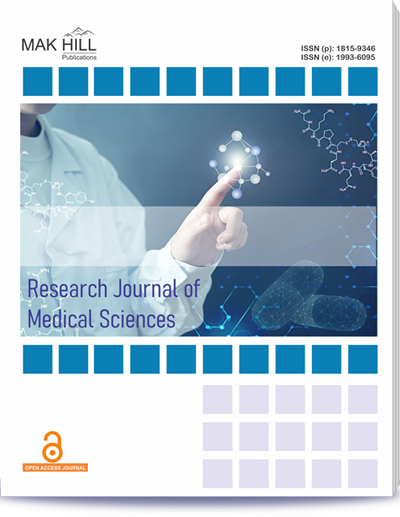
Research Journal of Medical Sciences
ISSN: Online 1993-6095ISSN: Print 1815-9346
Abstract
Hysterectomy is the standard treatment for all benign gynaecological conditions. Until recently a hysterectomy could either be performed abdominally or vaginally. In the last few years there have been enormous advances in our ability to use the laparoscope as a means of access to the abdominal and pelvic cavities.One of the significant concerns associated with hysterectomy is the decline in ovarian function post-surgery. This study aimed to evaluate the effect of bilateral salpingectomy during total laparoscopic hysterectomy (TLH) on ovarian reserve by measuring serum anti-Müllerian hormone (AMH) and follicle-stimulating hormone (FSH) levels postoperatively. A prospective cohort study was conducted at Sir Ganga Ram Hospital, New Delhi, including 100 women aged 38-50 years who underwent TLH for benign gynaecological conditions. Participants were divided into two groups: TLH with bilateral salpingectomy (TLH+BS, n = 50) and TLH without salpingectomy (TLH, n = 50). Serum AMH and FSH levels were measured preoperatively and at 6 and 12 weeks postoperatively. Hospital stay duration and postoperative complications were also recorded. There were no statistically significant differences in AMH levels between the two groups at baseline (5.7±12.6 pmol L‾1 for TLH+BS vs. 3.5±6.6 pmol L‾1 for TLH), at 6 weeks (5.6±12.1 pmol L‾1 vs. 3.5±6.6 pmol L‾1, p = 0.2874), or at 12 weeks (5.8±12.7 pmol L‾1 vs. 3.6±7.2 pmol L‾1, p = 0.2147). Similarly, FSH levels showed no significant differences between the groups at baseline or at 6 and 12 weeks postoperatively (p>0.05). The mean hospital stay was comparable between the TLH+BS group (2.94 ± 0.37 days) and the TLH group (3.02±0.38 days, p = 0.289). Bilateral salpingectomy during TLH does not significantly affect short-term ovarian reserve, as indicated by stable AMH and FSH levels at 6 and 12 weeks postoperatively. Additionally, salpingectomy does not prolong postoperative recovery or hospital stay.
How to cite this article:
Shivaji Ramrao Dhopte, Priyanka Shedmake and Tarun Kumar Das. To Study the Effect of Bilateral Salpingectomy on Ovarian Reserve During Total Laparoscopic Hysterectomy.
DOI: https://doi.org/10.36478/10.59218/makrjms.2024.7.18.690.694
URL: https://www.makhillpublications.co/view-article/1815-9346/10.59218/makrjms.2024.7.18.690.694